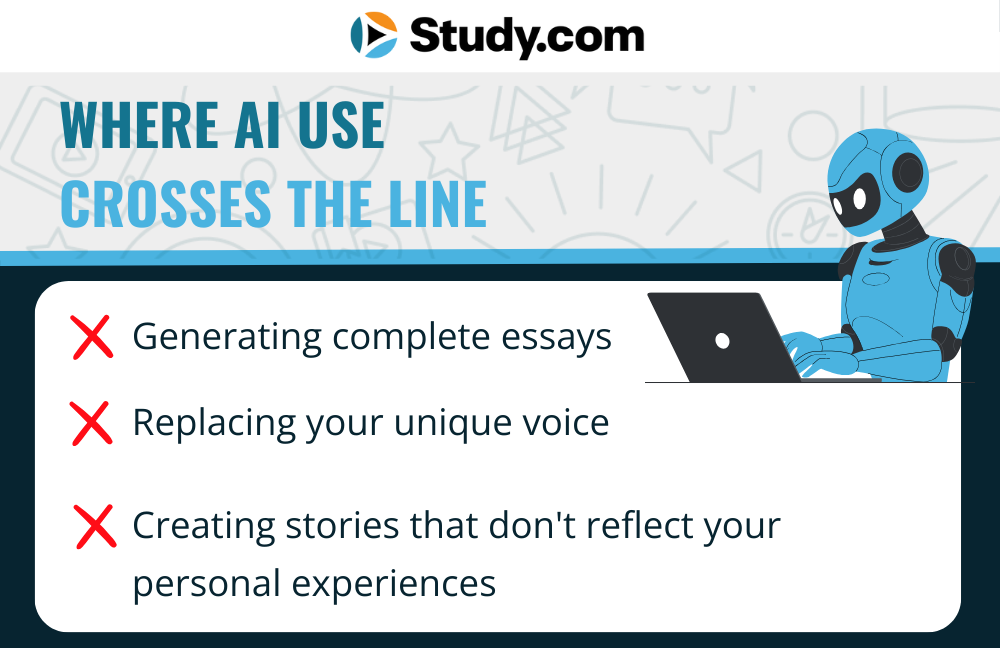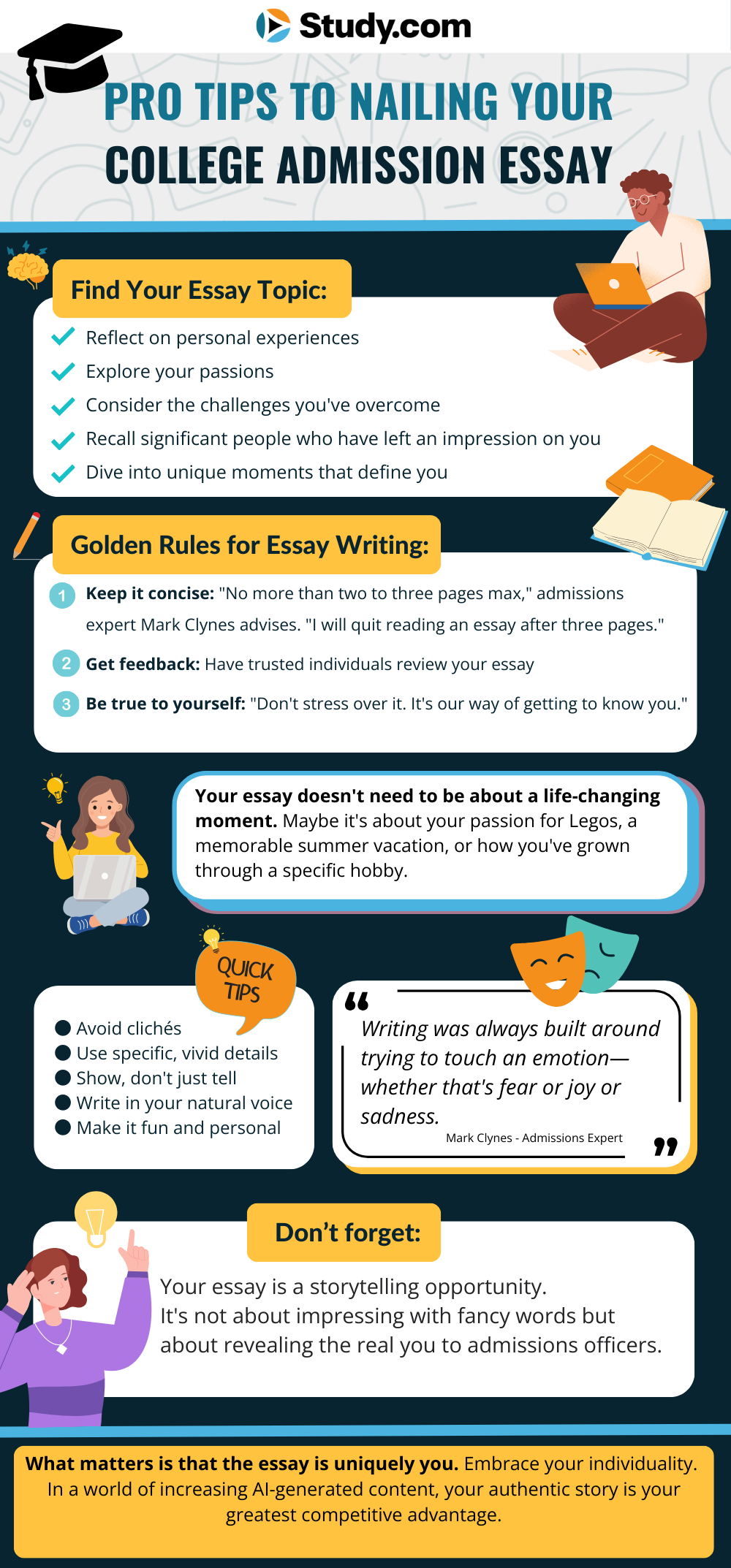Can AI get you into college? Admissions expert says think again

fizkes // Shutterstock
Can AI get you into college? Admissions expert says think again
Writing a college essay has always been nerve-wracking, but now there’s a new twist: artificial intelligence. With AI tools like ChatGPT at your fingertips, letting a computer write your way into college might seem tempting. But is that really a good idea?
Study.com sat down with Mark Clynes, a college admissions expert with 35 years of experience, to get the inside scoop on AI and college essays. Clynes has read thousands of students’ essays and knows exactly what admissions teams are looking for—and it’s definitely not a robot-generated response.
Why Essays Matter More Than You Think
College essays are way more than just another assignment. They’re your golden ticket to showing admissions officers who you really are beyond grades and test scores. Clynes, with his vast experience in college admissions, sees essays as a unique window into a student’s world.
“I’ve always read essays to get to know my students a little bit better,” he shares. “They help me understand particular situations—like why grades might have dipped one semester or learn about a family challenge.”
Think of your essay as a personal storytelling moment. It’s not about writing the most dramatic narrative, but about authentically representing yourself. Clynes recalls essays that have brought him to tears and made him smile—proving that genuine stories always stand out.
![]()

Study.com
How AI Is Being Used (and Misused) in College Applications
The emergence of AI technologies has introduced a complex ethical and practical challenge for the college application process. Is AI a helpful writing assistant or a potential application killer?
Mark Clynes offers a balanced perspective. “If it’s utilized for ideation or different wording, I’m okay with that,” he explains. Think of AI like a sophisticated writing companion—helpful for brainstorming and polishing language, but not for creating your entire narrative.
The critical distinction: AI can help you find the right words, but it can’t capture your personal journey. Admissions officers are looking for genuine emotions, not a perfectly constructed but soulless essay.
“An AI-generated essay doesn’t tell me about you,” Clynes warns. Your goal is to showcase your individual story, not to submit a generic, computer-generated response that could belong to anyone.
The Risks and Consequences of Using AI
Before logging in to ChatGPT to write your essay, remember that submitting AI-generated content could lead to serious consequences, as it likely violates college application policies.
Mark Clynes is crystal clear about the potential consequences: “If the student marks that yes, this is all true and honest, and they’re using AI for an essay, that’s misconduct.” Most college applications require you to certify that your submission is entirely your own work. Using AI to write your entire essay could be considered academic dishonesty.
But there’s more at stake than just potential disqualification. Colleges might respond by fundamentally changing their application process. “If it starts to reshape the essays too much, we’re going to just eliminate the essay,” Clynes warns. In other words, overuse of AI could result in colleges removing the essay option entirely, potentially making admissions even more numbers-driven.
“Schools will start using AI validity software that could garner an automatic denial for a student found to be plagiarizing too much. That student is also setting themselves up for potential failure in the classroom by taking a dishonest approach during the admission process,” Clynes adds.
What’s really at risk:
- Your application’s credibility
- Potential disciplinary action
- Losing the opportunity to tell your unique story
- Colleges potentially removing essay requirements
The bottom line: The short-term convenience of AI is not worth the long-term potential damage to your college application.
Spotting AI-Generated Essays
Think your AI-generated essay will slip past admissions officers? Think again.
Experienced admissions professionals like Mark Clynes have developed a keen eye for detecting artificial writing. “You can look at a student’s academic profile … and compare it to the level of writing,” he explains. This means if your AI-generated essay sounds dramatically different from your previous academic writing, it’s likely to raise red flags.
Key giveaways of an AI-written essay:
- Lack of personal pronouns: “The one word that every student uses is ‘I.’ When it’s missing, suspicions arise,” Clynes notes.
- Writing style that doesn’t match your academic records
- Language that lacks the natural, conversational tone of a student
- Generic emotional experiences
- Absence of genuine personal details
Remember: Admissions officers read thousands of essays. They can spot a computer-generated narrative from a mile away. Your unique voice is your strongest asset.
How to Strike a Balance with AI
AI isn’t the enemy—it’s a tool. But like any tool, it needs to be used wisely, especially when it comes to your college essay.
Mark Clynes suggests thinking of AI like an advanced brainstorming partner. “Writing was always built around trying to touch an emotion—whether that’s fear or joy or sadness,” he explains. Your goal is to maintain that true emotional depth while potentially using AI to refine your language.
Smart ways to use AI:
- Checking grammar and sentence structure
- Finding alternative word choices
- Helping overcome writer’s block
Danger zones to avoid:
- Letting AI write entire paragraphs
- Losing your personal voice
- Creating generic, emotionless content
Pro tip: Before submitting, ask yourself, “Does this essay sound like me?” If the answer is no, it’s time to revise.
Remember, your essay is more than just words on a page. It’s a personal narrative that gives admissions officers a glimpse into who you are beyond grades and test scores.

Study.com
What Makes a Great College Essay
Forget the myth that you need a dramatically tragic story to write a compelling essay. Every student has a unique narrative waiting to be told.
Mark Clynes shared a powerful example that illustrates this perfectly. A student was struggling with the college essay topic, unsure of what to write about. Clynes noticed the student’s application was filled with dance-related activities and asked, “Do you have a passion for dance?” When the student confirmed, Clynes encouraged them to write about their dance journey.
“Three days later, the student submitted a phenomenal essay,” he remembers. The essay traced the student’s journey from a two-year-old beginner to competing in a world dance competition.
Your Essay’s Secret Sauce:
- Originality: Tell your genuine story.
- Passion: Highlight what truly excites you.
- Reflection: Show how experiences have shaped you.
Unexpected essay topics that work:
- Your love for Legos
- A memorable summer vacation
- A hobby that defines you
- An influential person in your life
- A challenge you’ve overcome
“Everyone has a story,” Clynes emphasizes. Your essay doesn’t need to be earth-shattering—it just needs to be uniquely yours.
Pro tip: Don’t stress about creating a Hollywood-worthy narrative. Focus on moments that reveal your character, your growth, or your passions.
This story was produced by Study.com and reviewed and distributed by Stacker.